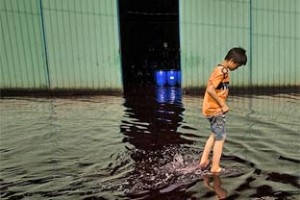As part of the C2C Fellows workshop application, we asked fellows to tell us what sustainability challenges keep them up at night. We want to know, do you worry more, less or the same about this issue as you do about the fact that more than two and a half billion people live on less than two dollars a day? More, less or the same than you worry about racism, sexism and homophobia? Why?
Here’s what Eliza Breder had to say:
The sky was as blue as it could be – even so – the weather forecast could change in an instant, and in an hour or two it could be raining – a common occurrence in Curitiba, Brazil. As we drove through the city and into the neighborhood Uberaba – the buildings became older, the roads more worn, and the people with long and tired faces. We pulled onto a dirt road – the thick orange clay beneath our tires matched the makeshift roofs of the houses we passed. ‘The neighborhood had recently been regularized’ Ana Isabel confirmed; the car bumped up and down along the road as we saw children playing in the streets – one flying a kite, others passionately chasing after a soccer ball into a large puddle of water. ‘The earth in this area is no good’ Ana Isabel complained; ‘sewage pipes were implemented into the streets here – but the clay earth did not take. They broke. There is barely a water supply. And the people here… how are they to afford the pipe connection from their homes to the sewage system in the streets?’ Her face was soft, her mouth long, and eyes heavy. The dirty body of water the children ran through suddenly had a new meaning.

Ana Isabel is the director of a program called “Se Ligue na Rede” meaning – ‘connect in the net’. It’s a program with Paraná, Brazil’s, State Sanitation Company – Sanepar. The program helps promote environmental consciousness and helps mitigate pollution by working with people in recently regularized neighborhoods to connect their home’s sewage pipes to the sewage network that Sanepar has implemented. As an intern, I took notes on the residents in these areas as she interviewed them. Specific questions were asked in order to help judge how much financial assistance the residents would need in the process of regularization. The process known as regularization in Urban planning means that residents of consolidated informal settlements are not relocated but given rights to the land through policy reformation in order to assure more adequate living and housing conditions.
In addition to the interviews on their personal information such as – who worked, who went to school, who they live with… We spoke to them about the watershed that they live in and the river not far from their homes. How implementation of sewage treatment is important for their health – and for the health of the ecosystem that we all participate in – regardless of class.
As someone who grew up in a part of the world that strives to separate the natural from the synthetic, the urban from the forest – and then again – the homes from the urban jungle – This internship was the first time I could really feel the connection between environmental problems and much of the poverty that can be found in the world. Their poverty kept them from living in more sanitary conditions, and this impediment made them a means of environmental pollution. These people, like many of those in informal settlements, have become a problem – while they are simply trying to survive. These people can become the solution. Not just in terms of social equality, but also for the environment.
The separation of the built and natural environment concerns me as this separation prevents innovative ideas in several areas such as policy, business, and design to help improve the basic quality of life for people, and for the environment.
I concern myself mainly with the use of water resources. I concern myself with the use of water in the developed world for irrigation – As well as the mechanisms to supply water to informal settlements or undeveloped areas of the ‘developing world’. Water is becoming a more and more scarce commodity. How efficiently we use it, manage it, value it… will shape our history – as it always has – but water has the likely hood to shape our history now more than ever due to its decrease in abundance.

Conditions of the environment around you – natural or synthetic – can dictate your well- being. The more we integrate the natural environment, and the processes found within the environment into our human constructs, the healthier and more self-sustaining our communities will be. It keeps me up at night to think that those two and a half billion people that live on less than two dollars a day are suffering, just as the environment suffers. The answer lies in sustainability – which is not just attention devoted to the wellbeing of the environment – but effort devoted to all beings that suffer from inequality – the environment, those in poverty, and those that suffer from discrimination. These problems are not linear, but they are connected and exist in a cycle that must be broken in order to improve the world.
Eliza Breder is a Research Assistant at UF with the Irrigation team in the Department of Agricultural and Biological Engineering. She majored in Sustainability and the Built Environment, a Construction and Design major, and studied abroad in Brazil in the year 2012. Eliza is fascinated by the opportunities and solutions offered by Rainwater Harvesting, and will be attending the C2C Fellows workshop at the University of FL in March, 2014.

